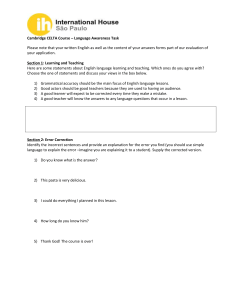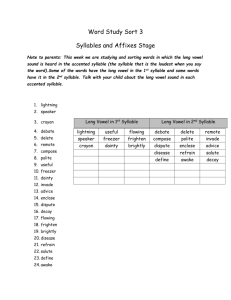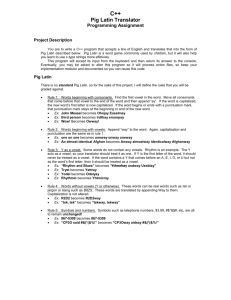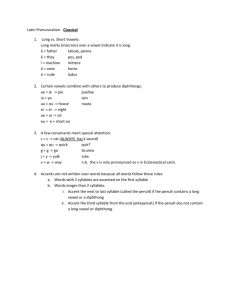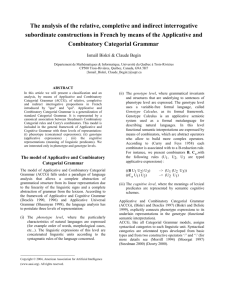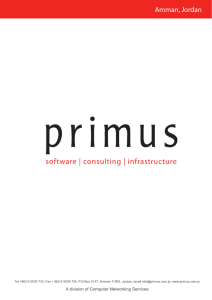Londinium There`s a problem with Londinium, the Latin name for
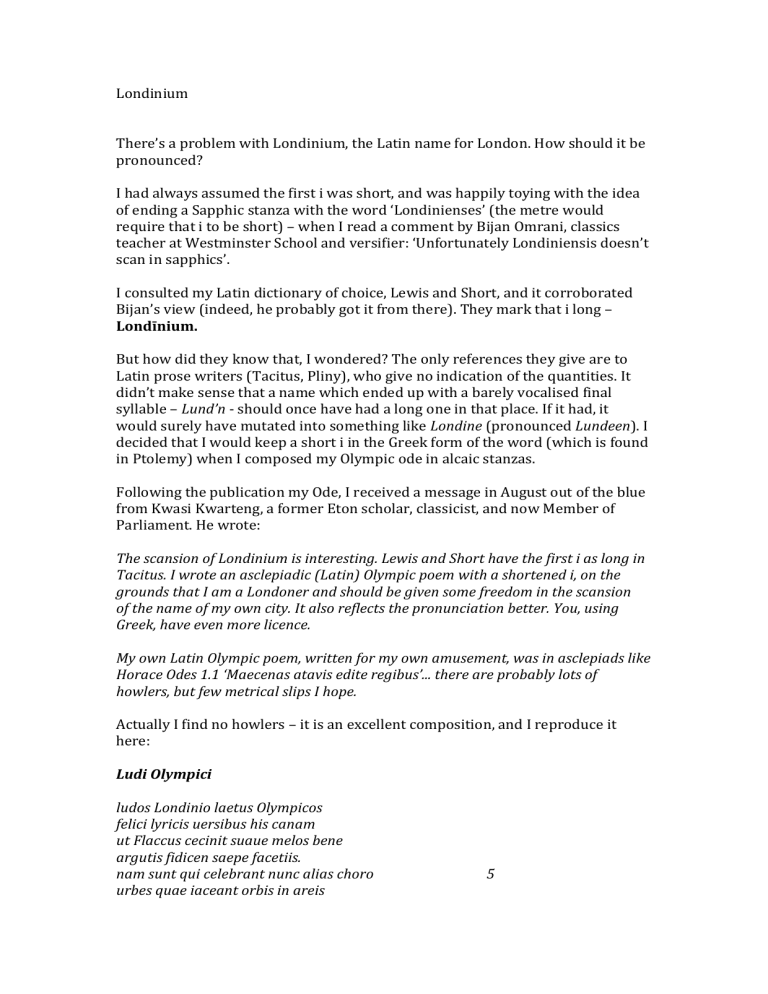
Londinium
There’s a problem with Londinium, the Latin name for London. How should it be pronounced?
I had always assumed the first i was short, and was happily toying with the idea of ending a Sapphic stanza with the word ‘Londinienses’ (the metre would require that i to be short) – when I read a comment by Bijan Omrani, classics teacher at Westminster School and versifier: ‘Unfortunately Londiniensis doesn’t scan in sapphics’.
I consulted my Latin dictionary of choice, Lewis and Short, and it corroborated
Bijan’s view (indeed, he probably got it from there). They mark that i long –
Londīnium.
But how did they know that, I wondered? The only references they give are to
Latin prose writers (Tacitus, Pliny), who give no indication of the quantities. It didn’t make sense that a name which ended up with a barely vocalised final syllable – Lund’n - should once have had a long one in that place. If it had, it would surely have mutated into something like Londine (pronounced Lundeen). I decided that I would keep a short i in the Greek form of the word (which is found in Ptolemy) when I composed my Olympic ode in alcaic stanzas.
Following the publication my Ode, I received a message in August out of the blue from Kwasi Kwarteng, a former Eton scholar, classicist, and now Member of
Parliament. He wrote:
The scansion of Londinium is interesting. Lewis and Short have the first i as long in
Tacitus. I wrote an asclepiadic (Latin) Olympic poem with a shortened i, on the grounds that I am a Londoner and should be given some freedom in the scansion of the name of my own city. It also reflects the pronunciation better. You, using
Greek, have even more licence.
My own Latin Olympic poem, written for my own amusement, was in asclepiads like
Horace Odes 1.1 ‘Maecenas atavis edite regibus’... there are probably lots of howlers, but few metrical slips I hope.
Actually I find no howlers – it is an excellent composition, and I reproduce it here:
Ludi Olympici ludos Londinio laetus Olympicos felici lyricis uersibus his canam ut Flaccus cecinit suaue melos bene argutis fidicen saepe facetiis. nam sunt qui celebrant nunc alias choro 5 urbes quae iaceant orbis in areis
seu gazis nitidae seu minus uberes, sed te, Londinium, laudibus integrum dico perpetuis progenies tua, praeclaro facilis carmine filius; 10 tu dilecta mihi semper eras diu, quae sic mater eras tu quoque nobilis. olim cum fuerant inter Achaicos ludi, grata quies perdomuit uiros saeuos, indocilis temporibus sacris. 15 cessent bella, precor! pax maneat pia dum gentes uariis uincere proeliis certant et uiridem carpere gloriam! est qui primus erit cursibus arduis, est qui tot pugilum cernitur optimus; 20 princeps nunc alius remigii sciens aufert arte manus aurea praemia; primus nunc citius nauta secet mare aut iam uictor erit qui salit altius, aut multis alius robore fortior 25 inuentus. sed eris maximus omnium uictorum, decus o dulce Britannicum, tu ludique boni, Londinium, tui.
I wrote back, wondering if Lewis and Short simply make that i long by analogy with Lavinium and Corfinium. In both these cases, we know the first i is long because the names occur in verse (in Virgil and Lucan). It's not clear that we could know for certain what the correct quantity of the only other Roman towns with that ending that I can find should be – Aeminium, Bilachinium, and
Corinium.
I mentioned this to Colin Leach, veteran classicist and versifier, who took a pragmatic approach:
Of course, if I keep that "i" long, I can write:
Londinienses accumulant tibi,
Armande, laudes, carmine qui tuo
Certamen (Alcaeum secutus)
Tollis Olympiacum per orbem.
(All Londoners extol your aims, since worldwide honour to the Games you furnish, Armand, with your ode created in Alcaic mode.)
The only thing left was to ‘phone a friend’. I dropped a note to the world expert
Oxford philologist John Penney, feedback on whose riveting lectures once included the phrase ‘Penney’s from heaven’.
John wrote:
I cannot imagine why L & S mark the i as long, and I don't in any case believe that they would be right to do so. There is, as far as I can see from all the attestations listed in Holder and Rivet & Smith, nothing to suggest that the vowel is long. In principle one should be able to tell from the form in which the name is borrowed into Old English, but OE Lunden in fact points to earlier *Lu:ndonion (: is a mark for vowel length), which is probably from *Lo:ndonion, with a treatment of the *o: that is variously ascribed to Vulgar Latin or to native British speech habits.
Some would account for the Londinium form as arising by dissimilation from the vowel of the first syllable (o...o > o...i), others as arising by attraction to the vowel of the third syllable; but others suppose that these are just different suffixes. Nothing in all this supports a long i, and indeed having short vowels everywhere would facilitate the assimilation/dissimilation process, if that is what is going on.
But a long vowel in the first syllable is a different matter, as one needs this to explain the spelling variations in the sources and the OE form: do you suppose that this is where the macron is supposed to be in L & S? I don't think you need change anything in your splendid ode: Londinion is a perfectly good Greek spelling
(Ptolemy), and there is, as far as I can see, no evidence for a long i.
Most philological queries, alas, seem to involve taking the lid off a can of worms.
What a relief to have an expert pronounce so clearly on the matter! If the spirit takes me, I shall now happily embark on Latin Sapphics with ‘Londinienses’ in my mind for the coda of a stanza. The fact is that I have been storing up for use at the appropriate moment another Sapphic coda: the Virgilian phrase ‘primus ab
oris’ . This was once artfully misread as ‘primus, a, Boris’ – ah, Boris first! But that’s another story.

